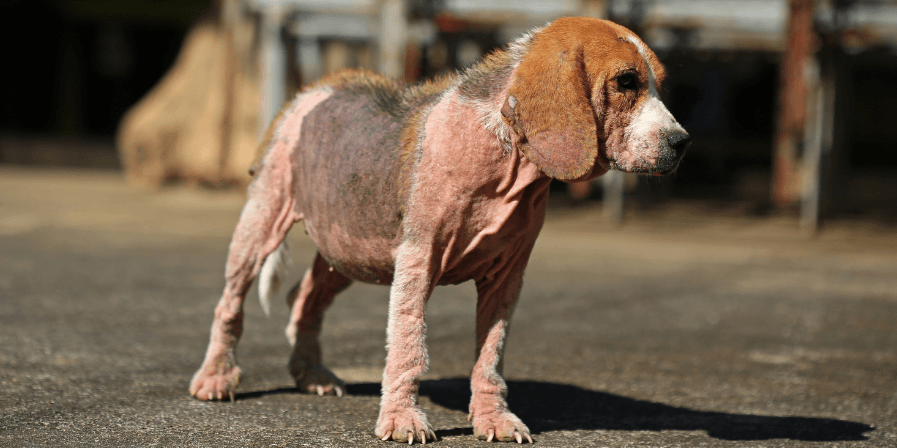Mange in Dogs Types, Symptoms, Causes, and Treatments

Learn about mange in dogs, including its types, symptoms, causes, and treatments. Discover how to keep your dog healthy and comfortable.
Mange in Dogs: Types, Symptoms, Causes, and Treatments
Mange is a skin condition caused by microscopic mites, leading to severe itching, hair loss, and skin infections in dogs. Understanding its types, symptoms, causes, and treatments is crucial for ensuring your pet’s health and comfort.
Types of Mange in Dogs
1. Demodectic Mange (Demodicosis)
- Caused by: Demodex canis mites, normally present in small numbers but problematic when the immune system is compromised.
- Symptoms: Hair loss, red and scaly skin (typically on the face, legs, or trunk). Severe cases can lead to bacterial infections and thickened skin.
- Common in: Puppies and dogs with weakened immune systems.
2. Sarcoptic Mange (Scabies)
- Caused by: Sarcoptes scabiei mites, which burrow into the skin, causing intense itching.
- Symptoms: Intense itching, red rash, hair loss, thick yellow crusts, and sores from scratching. Often begins on the ears, elbows, and belly.
- Highly Contagious: Can spread to other animals and humans.
3. Cheyletiellosis (Walking Dandruff)
- Caused by: Cheyletiella mites, large enough to be seen with the naked eye.
- Symptoms: Dandruff-like flakes, mild itching, and redness. The mites move under the scales, resembling moving dandruff.
- Contagious: Can spread to other pets and humans.
Mange Symptoms in Dogs
- Intense Itching and Scratching: Persistent biting, licking, and scratching of the skin.
- Hair Loss: Patchy hair loss, particularly around the face, ears, legs, and trunk.
- Red, Inflamed Skin: Redness, swelling, and inflammation in affected areas.
- Sores and Scabs: Open sores and crusty patches due to excessive scratching and secondary infections.
- Thickened Skin: Chronic cases may result in thickened, leathery skin.
- Dandruff: Flaky skin resembling dandruff, especially noticeable in Cheyletiellosis.
Causes of Mange in Dogs
- Weakened Immune System: Dogs with weakened immunity are more susceptible to demodectic mange.
- Close Contact with Infected Animals: Sarcoptic mange and Cheyletiellosis spread through direct contact.
- Poor Living Conditions: Unsanitary environments increase the risk of mite infestations.
- Genetics: Some breeds have a genetic predisposition to mange due to immune response factors.
Treatment and Prevention
1. Veterinary Diagnosis and Treatment
- Diagnosis: Skin scrapings examined under a microscope to identify mites.
- Medications: Prescription treatments such as ivermectin, milbemycin, selamectin, or moxidectin. Topical shampoos may also be recommended.
- Antibiotics: For treating secondary bacterial infections.
2. Environmental Cleaning
- Regularly clean bedding, toys, and living spaces to eliminate mites and prevent re-infestation.
3. Boosting Immune Health
- Provide a balanced diet, regular exercise, and minimize stress to strengthen your dog’s immune system.
4. Isolation
- Keep infected dogs away from other pets to prevent the spread of contagious mange types.
5. Regular Check-ups
- Routine veterinary visits help monitor health and detect early signs of mange.
FAQ’s
1. How long does it take for a dog to recover from mange?
Recovery varies based on severity, type of mange, and treatment effectiveness. Complete recovery can take weeks to months.
2. Are certain dog breeds more prone to mange?
Some breeds may have genetic predispositions to mange due to immune system factors. Consult your vet if concerned about your dog’s susceptibility.
Conclusion
Recognizing the symptoms and understanding the causes of mange enables dog owners to take prompt action. Always consult a veterinarian for an accurate diagnosis and tailored treatment plan to keep your dog healthy and comfortable.
For the best veterinary care in Delhi, Gurgaon, and Noida, call us at 9311560101 or visit dccpets.in.